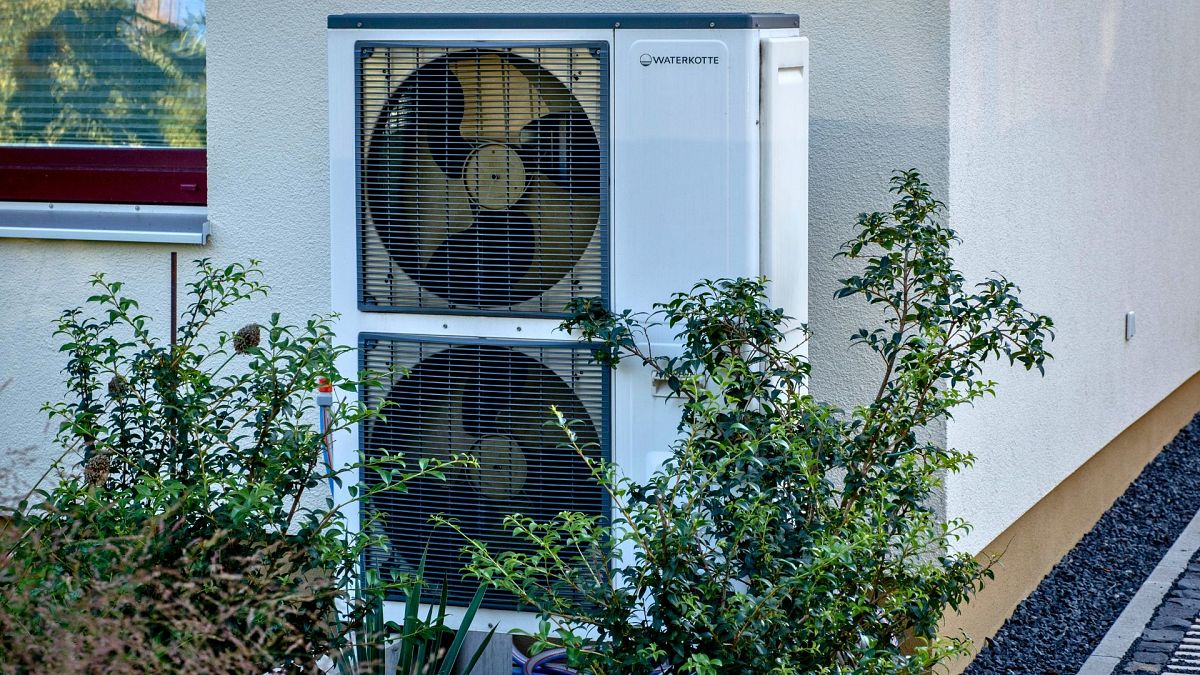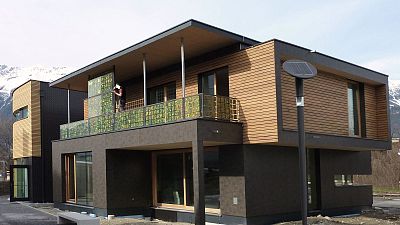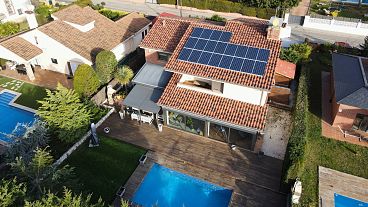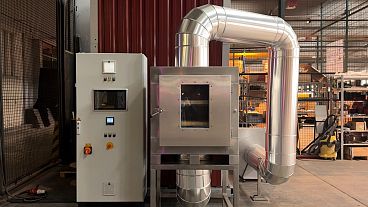Is your home ‘heat pump ready’? Here's why careful costing is essential before installing the green tech.
With winter in full swing, your eye-watering energy bills might have you looking at alternative forms of heating.
Heat pumps promise lower emissions, and potentially lower costs. With many European countries offering subsidies to install the green tech, is it time to make the switch?
In a recent study, scientists at Cambridge University, UK, recommend a careful cost assessment before saying goodbye to your gas boiler.
They found that heating demand may increase by up to 20 per cent following the switch to an air source heat pump.
Euronews Green spoke to report co-author Dr Ray Galvin to find out how this could impact your energy bills.
How could a heat pump increase your heating demand?
Since heat pumps work at a much lower temperature than gas boilers - around 55C compared to 65-75C - they take longer to warm up a room.
This usually means that households need to change their heating schedule when switching to a heat pump to achieve the same comfort as before, either by allowing more time for heating up or maintaining a constant ‘setback’ temperature.
This can increase your overall heating demand by between 5 and 20 per cent, according to the study published in the peer-reviewed Energy and Buildings journal.
Demand will be higher in homes that are only heated for short periods during the day. Homes with poor insulation and a low thermal mass - meaning they cool more quickly - will also require more heating, as will those in places with cold winters.
There are other costs to factor in, too. The lower operating temperature of heat pumps means that larger radiators are needed to feel their benefit. Therefore it’s sometimes necessary to change your radiators when installing a heat pump.
It’s also important to consider your hot water supply when installing a heat pump. Since they cannot provide hot water on demand, you may need to install a hot water cylinder too.
How energy efficient does your home need to be to make a heat pump worthwhile?
It is possible to estimate your increase in demand based on your heating patterns, the local weather and your home’s energy efficiency, the researchers say.
Some studies say that almost any house can operate with a heat pump. But more energy efficient homes will see lower operating costs, says Dr Galvin.
Your home’s estimated annual heating demand can help you decide whether a heat pump is a good investment.
This can be found on your home’s energy performance certificate (EPC) and is measured in kilowatt hours (kWh) per square metre per year. You can also check your bills to find out how many kWhs you are using per square metre, but you’ll need to subtract the fixed charges.
A house that’s estimated to use 70 kWh on its current gas boiler system is likely to be reasonably energy efficient, with basic but effective double glazing, decent cavity wall or external wall insulation, and reasonable insulation in the attic and under the floor.
In homes of this standard, a heat pump will generally work effectively enough to make it worthwhile, says Dr Galvin.
But since the heating requirement stated on your EPC is for your old heating system, it does not necessarily provide an accurate estimate of your heating needs with a heat pump.
Knowing the heat loss and thermal mass of your home can help with the last of these points, but this information is currently not provided on home energy performance certificates.
The researchers recommend that these factors be added to EPCs, alongside the already included space heating requirement. This will allow accurate assessments of energy demand to be made before installing a heat pump, rather than working on the assumption that demand will remain the same.
A large predicted increase in energy demand could be reduced by improving a building’s insulation and air-tightness to reduce heat loss.
As a side note, don’t forget that well insulated houses must be aired regularly. Dr Galvin recommends “shock ventilation”: opening all of the windows for a couple of minutes in the morning and again in the late afternoon. This allows for a change of air without giving the walls too much time to cool down and losing the benefit of the heating.
How to maintain a comfortable temperature with a heat pump
Comfort-wise, the lower temperature of heat pumps needn’t have a big impact if you have regular heating needs, as you can set a timer for when you wake up in the morning and when you return home in the evening, for example.
But if you require heating more sporadically, you’ll find you need to wait longer for a room to warm up.
“In some cases it might pay to have the heating running on very low all the time in winter,” during the day, says Dr Galvin. He recommends actively testing different heating patterns to figure out the best balance between comfort and consumption.
In some cases, he adds, it can help to use a small infrared heater with a timer to warm up a room quickly when needed, to make up for the heat pump’s lag.
Are heat pumps cheaper to run than gas boilers?
Heat pumps run on electricity rather than gas. In Europe, there is a big difference in pricing between the two.
In the UK, gas is currently around £0.07 (€0.08) per kWh whereas electricity is around £0.28 (€0.33) per kWh. This is partly because electricity is subject to carbon taxes, whereas gas used for heating isn’t. Policy costs, such as those tackling fuel poverty and promoting renewable energy, are also often added onto electricity bills.
Similarly in the EU, gas is currently €0.08, while electricity is almost €0.29.
Indeed, heat pumps can be as much as three times more efficient than gas boilers because the heat is transferred rather than generated. Despite this, the huge price gap between gas and electricity means they are not always cheaper.
If the price of electricity were only three times that of gas, heat pumps would work out roughly cost neutral, explains Dr Galvin. Although that isn’t currently the case, it could still pay off to install a heat pump now.
“There is a gap between the cost of running a boiler and the cost of running a heat pump,” he says. “But it’s not huge, if you're sensible about how you do it. And it may actually swap over in the future.”
Some experts advise even greater caution, though. Although there are many factors to consider, "ideally the ratio of electricity to gas prices should be closer to 2.5 or even better two," says Dr Jan Rosenow of the Regulatory Assistance Project (RAP), an NGO advising on energy and air quality. "That way a heat pump would pay off in the vast majority of cases."
But, like Dr Galvin, he stops short of advising against installing a heat pump now.
"With a very efficient system plus special tariffs, even today you can save a lot of money with a heat pump."
Should you install a heat pump now?
Although in terms of pricing, we have not quite reached cost neutrality on heat pumps, “We simply have to decarbonise”, says Dr Galvin.
In rules released this month to boost the energy performance of buildings, the EU made it clear that we need to get off gas and onto electricity, and set out plans for decarbonising the grid. This is “a big challenge that has to happen, and has to go hand in hand with the transition to heat pumps, electric vehicles,” and so on, says Dr Galvin.
The EU’s Energy Performance of Buildings Directive calls for a complete phase-out of boilers powered by fossil fuels by 2040.
This could make heat pumps necessary or even compulsory in some countries, so installing one now is likely to pay off in the long run. It will also shield you from gas price hikes.
“If you've got the money up front, I would say it's probably best to transition sooner rather than later,” says Dr Galvin.
He points out that a sudden surge in demand for heat pumps if new rules come into force could see a shortage of installers in the future.
Should you install solar panels to power your heat pump?
In an ideal world, Dr Galvin also recommends installing solar panels to supply your heat pump with clean, cheap electricity.
He refutes the argument that the two forms of green tech are seasonally incompatible, with heat pumps required most in winter and solar panels supplying the most energy in summer.
“In fact, there's this huge shoulder season on both sides, where the sunshine does make a difference,” he says.
Through extensive modelling, he’s shown that photovoltaics are effective at lowering the cost of operating a heat pump, so long as the panels are the optimum size. For a three-bedroom house, he estimates that 3 kW is adequate.
“70 kilowatt hours, plus a heat pump, plus photovoltaics is… about the most economically viable you're going to get,” he says.
Many countries are offering grants and subsidies to help with the transition, with the UK recently raising its air source heat pump grant from £5,000 to £7,500.
However, Germany backtracked on heat pump subsidies this month as it struggled with its deficit, showing that green grants are often the first to be targeted by cuts.



